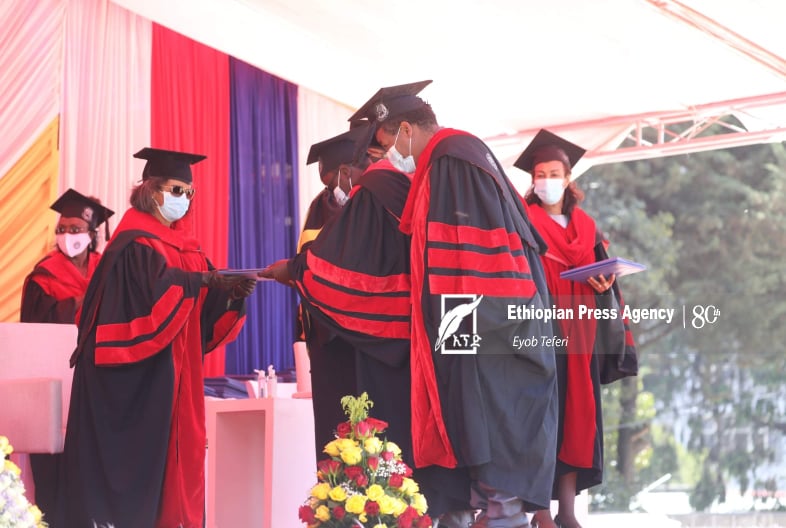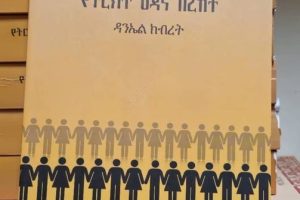
BY LEULSEGED WORKU
Following the outbreak of COVID-19 several universities in the country were forced to close their doors and they were teaching students via different electronic media.
Until the outbreak of the pandemic, it was normal to see final year students busy handling their paper and preparing themselves to the graduation ceremony. However, this year was not that easy to perform that task. COVID-19 pandemic together with political instability in some parts of the country had made it difficult to perform the usual graduation month’s routines.
Lately, Addis Ababa University has graduated more than 4,087 students in different fields of studies. On the event, event`s guest of honor FDRE president, Sahlework Zewde, had congratulated students and urged them to stand for the good of their country and fight all forms of inhumane activities.
According to her, since Ethiopia is the only country we have, nurturing a peaceful environment for all people is the only and best way to lead a smooth life. She also indicated that since Ethiopiansm is founded on basic principles of equality, graduate students should stand for the good of others.
As it was indicated by President Sahlework Zewde, this (2020) batch is unique for several reasons. According to her, it is a batch that has been struggling to cope up with the challenges of COVID-19 pandemic and it is also a batch that successfully accomplished its class despite the political instability in the nation.
Seconding President Sahlework’s view, University President Professor Tassew Wolehanna, said, despite all the challenges, the university is able to graduate its students. According to him, while marking their graduation program students should remember the responsibility the nation has put on them.
Using the speech of the president as a ground, The Ethiopian Herald had interviewed some students to reflect their view how ready they are to stand for peace and fight inhumanity.
Michael Wondyifraw, is a graduate student in Logistics and Supply Management. According to him, being an Ethiopian is loving one another. “When it comes to Ethiopia, Everybody has to think only one love to sustain the nation. Perception of responsibility towards our country should be our motto towards seeing one strong nation.
Graduates should not have a blurred view in areas of tolerance. They have to see things from different perspectives. We need to think out of the box. We may have graduated in one discipline, but we can think globally and act locally. This is the true meaning of education. As it was once said by Emperor Haile Selassie I, Education is the key to the future.”
Asked why everyone talks about one love and tolerance but cannot practice it, Michael said, “I cannot generalize on that. There are people who talk about love and tolerance but never try to practice it. At the same time, there are also true Ethiopians who practice what they talk.”
Love and respect are like an echo, says Michael. One will receive back what he gives. The more one loves others, the more s/he will get love back. This is what we need for Ethiopia.
According to Michael, focusing on the bright side of Ethiopia gives us more strength to live in harmony. Whenever we focus on the darkest part, we will be swallowed by it and fail to see the light.
“But, it must be remembered one thing that, we need to drive the vehicle with the same speed. If one talks and the other performs there will be interest conflict. Ethiopia is our only country. We have no other nation. We should practice what we talk.”
According to him, Universities are truly a little Ethiopia where we can get people from different walks of life. They are places where almost all ethnic groups are represented either in the form of lecturer or student or other staff. Therefore, learning tolerance and love should start there.
Having a sound mind that can withstand biased individuals and their sneaky moves has a positive impact in nurturing tolerance in universities. He also said, ethical foundations of a given person should be supported by moral principles that force that particular person to love and respect others.
“Moral principle of a given person affects not only his lifestyle, but also others. In this respect, having a sound moral principle is not only good for university students, but also to the whole human kind. By nurturing morally and ethically responsible values we can nurture peace.”
He further said, Ethiopiansim is Utopianism. “No matter how situations are hard, Ethiopians are always together under the banner of love. That is why I call Ethiopianism Utopianism.”
Mistere Daniel, is a graduate student from the Department of History. For Mistere, the last years had its challenges. These challenges are both COVID-19 related and political causes. However, despite those challenges, we have successfully accomplished our class.
Mistere believes that failure to learn from our previous mistakes is one reason behind instabilities. She said, considering one group enemy for the sake of personal or group political interest is the reason behind all the challenges. Thus, by learning from our previous histories, we can build the new Ethiopia that values every individual`s identity.
Tadesse Yimer is the other graduate student whom The Ethiopian Herald interviewed. According to him, the current situation in some parts of the nation needs every one of us to think twice. “What we hear from the media is not something we expect from a nation with centuries old experience in tolerance.”
According to him, having a degree, Masters or Ph.D, in a given field of study does not make a person educated if s/he fails to live for others and nurture peace.
Everyone has a share in nurturing a moral principle to build a strong and peaceful Ethiopia. In addition to what we have learnt in class, we need to have moral values that enable us to live in harmony. We should be fair in every walk of life and be open to new ideas.
Loving a neighbor is a true identity of every Ethiopian. When one loves his or her neighbor he/she will learn to love others. This is how our parents used to live.
The Ethiopian herald December 31/2020




